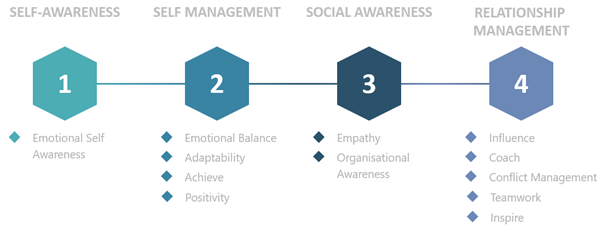Emotional Intelligence, AI and Procurement
What is Emotional Intelligence?
Emotional intelligence is the ability to recognise one’s emotions, and the ability to influence the emotions of others. The concept of Emotional Intelligence (EQ) was originally developed by Peter Salavoy and John Mayer in 1990. Goleman, furthered the concept in his many published journals, articles and books since. EQ is the levels of emotional quotient an individual has. There are four domains, including 12 competencies

Self Awareness
This is the extent to which we are aware of our emotions, recognising our own feelings, in the moment, as they happen. Individuals that are self-aware can steer their decision making, you could argue therefore making better choices as they understand their true feelings. So, they make a decision based on their feelings rather than make a rushed decision and then consider their feelings later. Perhaps individuals with low levels of self-awareness go onto regret the decisions they make.
Emotional Self-Management (previously motivation and self-regulation)
Maintaining an emotional balance, adaptability, achievement, and positivity. Individuals who can manage their emotions are quick to bounce back from rejection, failure, a bad decision and quickly change from feelings of doom and gloom to positivity.
Social Awareness, Empathy, and organisational awareness.
Being able to identify the moods and feelings of others and organisation. Social awareness used in correlation with emotional self-management enables adaptability of behaviours accordingly to demonstrate empathy.
Relationship Management
– Includes influencing, coaching, conflict management, teamwork, and inspiration. Being able to influence and guide others willingly is an essential skill for teamwork, managers, and leaders alike. High levels of this competency will ensure you stand out from the crowd.
According to Goleman (2020) employees with high levels of EQ experience higher levels of job satisfaction, increased productivity, and greater wellbeing. For organisations this would demonstrate benefits in terms of increased efficiencies and profits. Soft skills historically have often been sniffed at and discussed as a nice to have however in recent decades organisations have begun to take notice and recognise the value these strengths bring.
You don’t have to have IQ to be successful!
Emotional Intelligence is often compared to Intelligence (IQ) and argued that having high intelligence will make individuals perform better than those with low levels of intelligence, however, this is not necessarily true. High levels of emotional intelligence and the related competencies can increase one’s potential no matter what level of intelligence. What does this mean? It means individuals with high levels of EQ will perform well regardless of their level of IQ.
Historically research has demonstrated that employers would select employees with high levels of EQ v IQ. It is unrealistic that an individual will have extremes of IQ, or EQ be completely absent unless their amygdala is removed or damaged therefore removing all emotions and forcing a purely rational approach to thinking, void of all feelings of emotion and a complete lack of emotional intelligence.
As I am not a neuroscientist, I will not expand further but will leave you with this; emotional intelligence is linked to neural science, LeDoux’s (2000) work in this area explains the link between amygdala and its connection to the neocortex which are key to emotional intelligence. Emotional intelligence research has and advanced significantly since Peter Salavoy and John Mayers research in the 1990’s. Exciting to watch as this evolves!
Impact of Artificial Intelligence
AI is technology that enables computers to think or act in a human way. Computers are being developed to learn from mistakes, robots are being taught emotions. Worried? Fear for your job?
Will they ever be able to mimic somebody with high emotional intelligence? Can AI sense emotions, manage emotions, become self or socially aware? No! Not yet. If your role requires high levels of EQ, you are safe, for now. High levels of emotional intelligence is essential to compete with AI.
Could AI replace you in your role? With AI gaining momentum fast you would be right to be concerned. AI is fast replacing roles throughout industries, but not all! Many roles will always require those soft skills which is why emotional intelligence training and thinking is essential. With AI still developing, having high EQ will be very desirable to business for a while yet.
No matter how advanced artificial intelligence becomes it will never replace emotions, interactions, relationships, and these are a huge part of business interaction and relationship management.
Why is EQ important to Procurement?
The importance of EQ is becoming more prevalent in both professional and personal lives. We have all been there, reacted irrationally to a phone call, message, letter, a staff meeting, had an outburst of emotion, even made a statement without thinking of others and how they may feel. After the outburst we feel sad, bad and potentially could have damaged relationships and lost respect.
Have you ever had to hide a smile when a negotiation has gone your way? Demonstrated your frustration when it hasn’t? Delivered a message to a supplier that was devastating to their business?
Being able to manage and regulate our and other’s emotions are key attributes of procurement professionals. Emotional Intelligence benefits all levels of procurement from junior to senior roles. The earlier individuals receive EQ training the better, it should be embedded as early as possible. We are seeing trends whereby soft skills thinking are being embedded not just into training for organisations but also in educational programmes including vocational qualification for individuals as young as school age. The 12 emotional intelligence competencies are often used in recruitment and selection of employees; whether you are employing or job seeking it’s important to learn more about them.
Many organisations are training their employees and realising the benefits of emotional intelligence competencies. Ensure you don’t miss out on these essential skills to develop yourself, your team or organisation. Prepare yourself for the future.

This article was written by Susan Rashid FCIPS, MBA, CPSM, PGCE, Founder & Managing Director of SR Supply Chain Consultants and Co Founder of SR Strategic Sourcing.
If you would like to discover how these soft skills and competencies can be embedded into your organisation contact us at info@srstrategicsourcing.co.uk
Useful websites and references:
https://www.psychologytoday.com/us/basics/emotional-intelligence
https://www.annualreviews.org/doi/abs/10.1146/annurev.neuro.23.1.155
Goleman D, (2020). Emotional Intelligence. London: Bloomsbury Publishing
LeDoux, J.E. (2000) Emotion Circuits in the Brain. Annual Review of Neuroscience, Vol 23:155-184
Mayer, J., Salavoy, P., Emotional Intelligence. Imagination, Cognition and Personality Journal
